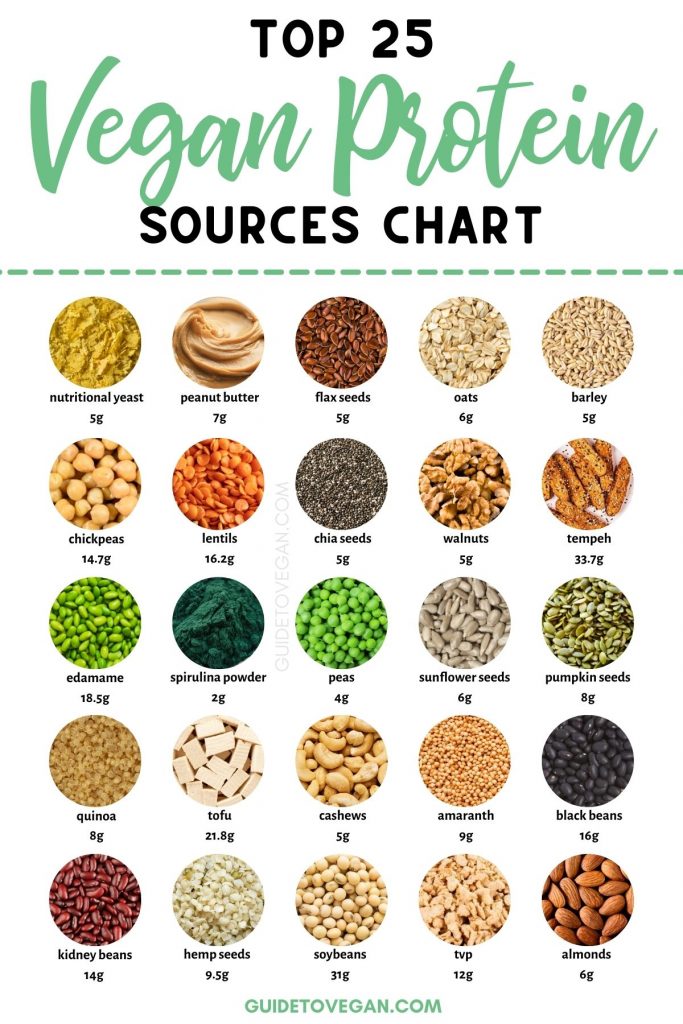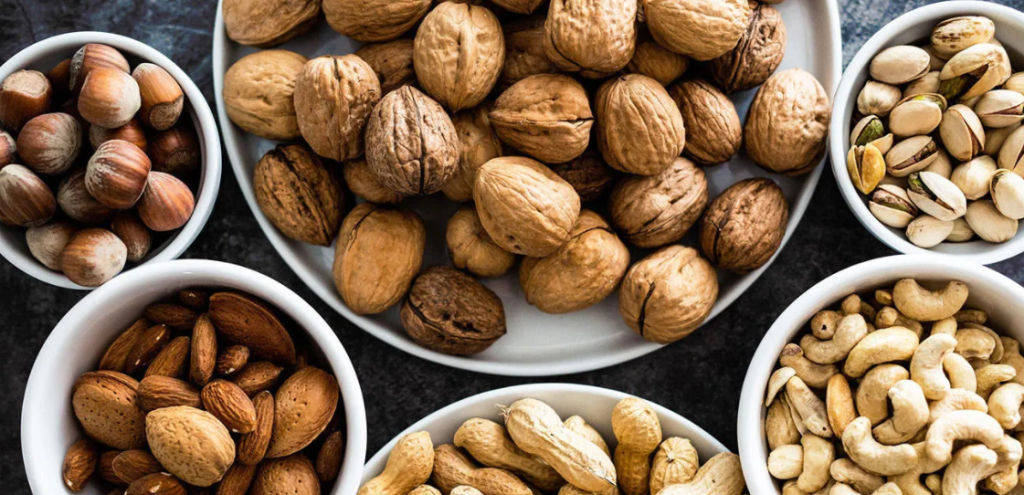
Vegetarians can obtain their protein from a variety of plant-based sources. Here are the top 20 protein sources for vegetarians:
- Legumes: Lentils, chickpeas, black beans, and other legumes are rich in protein and fiber.
- Tofu and Tempeh: Soy-based products like tofu and tempeh are versatile sources of protein.
- Seitan: Made from wheat gluten, seitan is high in protein and has a meaty texture.
- Quinoa: This grain is a complete protein source and is also rich in fiber and nutrients.
- Nuts and Nut Butters: Almonds, peanuts, and other nuts, as well as nut butters, provide protein and healthy fats.
- Seeds: Pumpkin seeds, chia seeds, and flaxseeds are nutrient-dense sources of protein.
- Greek Yogurt: For lacto-vegetarians, Greek yogurt is a protein-rich dairy option.
- Cottage Cheese: Another dairy option, cottage cheese is high in protein and calcium.
- Eggs: For ovo-vegetarians, eggs are a complete protein source.
- Spinach: Leafy greens like spinach offer protein along with other essential nutrients.
- Broccoli: This cruciferous vegetable contains protein and various vitamins.
- Mushrooms: While not extremely high in protein, mushrooms are a good plant-based source.
- Chia Seeds: These tiny seeds are rich in protein, fiber, and omega-3 fatty acids.
- Hemp Seeds: Hemp seeds are complete protein sources and also provide healthy fats.
- Edamame: Young soybeans are a protein-packed snack or addition to meals.
- Peas: Green peas and split peas are protein-rich legumes.
- Whole Grains: Whole grains like brown rice, barley, and oats contain moderate protein.
- Spirulina: This blue-green algae is a complete protein source and offers other nutrients.
- Lentil Pasta: Made from lentil flour, this pasta is higher in protein than traditional pasta.
- Plant-Based Protein Powder: Many types of protein powders are available, including those made from pea, rice, or hemp protein.

Protein Source for Vegetarians with table of protein contains per 100g
Sure, here’s a table listing 40 vegetarian protein sources along with their approximate protein content per 100 grams:
| Protein Source | Protein Content per 100g (grams) |
|---|---|
| Lentils | 9 |
| Chickpeas | 8.9 |
| Black Beans | 8.9 |
| Tofu | 8.1 |
| Tempeh | 19.5 |
| Seitan | 25 |
| Quinoa | 4.1 |
| Almonds | 21.2 |
| Peanuts | 25.8 |
| Chia Seeds | 16.5 |
| Pumpkin Seeds | 30.2 |
| Greek Yogurt | 10 |
| Cottage Cheese | 11.1 |
| Eggs | 12.6 |
| Spinach | 2.9 |
| Broccoli | 2.8 |
| Mushrooms | 3.1 |
| Hemp Seeds | 31.6 |
| Edamame | 11.2 |
| Green Peas | 5.4 |
| Whole Wheat Bread | 8.1 |
| Oats | 16.9 |
| Spirulina | 57.5 |
| Lentil Pasta | 14 |
| Sunflower Seeds | 20.8 |
| Cashews | 18.2 |
| Flaxseeds | 18.3 |
| Pistachios | 20.6 |
| Sesame Seeds | 17.7 |
| Hummus | 7.9 |
| Brown Rice | 2.6 |
| Amaranth | 14.4 |
| Pinto Beans | 9.9 |
| Steel-Cut Oats | 16.9 |
| Wild Rice | 14.7 |
| Non-Dairy Yogurt | Varies |
| Seaweed | Varies |
| Cashew Butter | 19.4 |
| Hazelnuts | 14.1 |
| Brussels Sprouts | 3.4 |
| Artichokes | 2.2 |
| Protein Source | Protein Content per 100g (grams) |
|---|---|
| Lentils | 9 |
| Chickpeas | 8.9 |
| Black Beans | 8.9 |
| Tofu | 8.1 |
| Tempeh | 19.5 |
| Seitan | 25 |
| Quinoa | 4.1 |
| Almonds | 21.2 |
| Peanuts | 25.8 |
| Chia Seeds | 16.5 |
| Pumpkin Seeds | 30.2 |
| Greek Yogurt | 10 |
| Cottage Cheese | 11.1 |
| Eggs | 12.6 |
| Spinach | 2.9 |
| Broccoli | 2.8 |
| Mushrooms | 3.1 |
| Hemp Seeds | 31.6 |
| Edamame | 11.2 |
| Green Peas | 5.4 |
| Whole Wheat Bread | 8.1 |
| Oats | 16.9 |
| Spirulina | 57.5 |
| Lentil Pasta | 14 |
| Sunflower Seeds | 20.8 |
| Cashews | 18.2 |
| Flaxseeds | 18.3 |
| Pistachios | 20.6 |
| Sesame Seeds | 17.7 |
| Hummus | 7.9 |
| Brown Rice | 2.6 |
| Amaranth | 14.4 |
| Pinto Beans | 9.9 |
| Steel-Cut Oats | 16.9 |
| Wild Rice | 14.7 |
| Non-Dairy Yogurt | Varies |
| Seaweed | Varies |
| Cashew Butter | 19.4 |
| Hazelnuts | 14.1 |
| Brussels Sprouts | 3.4 |
| Artichokes | 2.2 |
1. Tofu

- Eating tofu and other soy foods every day is generally considered safe.
- Tofu greatly aids in reduction of belly fat because of its high content of soy isoflavones.
- Between 3 and 5 servings of soy per day is believed to be safe and beneficial based on current evidence. (255g to 425g per day)
2. Nuts & Seeds

- You may need more than 30 grams of nuts and seeds a day to ensure adequate protein.
- Eat them with vitamin C rich foods and add them to drinks (such as tomato, capsicum, orange and citrus juices) to boost your iron absorption.
- eating nuts and seeds daily can lower your risk of diabetes and heart disease and may even lengthen your life.
3. Peas

- About 1/3 cup (117 grams) to 1/2 cup (170 grams) of green peas at a time is enough for most people
- They are more likely to cause problems when consumed in high amounts.
4. Pulses

- suggests that 30 g and 60 g of whole uncooked pulses be consumed daily by nonvegetarians and vegetarians, respectively.
- In other words, One serving size of pulses is equivalent to ¼ cup raw pulses, which cooks up to ½ cup of cooked pulses. A ½ cup of cooked pulses is equivalent to 1 serving of vegetables and a two-ounce meat equivalent.
5. Broccoli

- For adults only need about 2.5 cups of cooked vegetables per day (you’ll need a slightly larger amount if they’re raw).
- Or A portion is 2 broccoli spears or 4 heaped tablespoons of cooked kale, spinach, spring greens or green beans.
6. Quinoa

- 1 cup dry quinoa = about 3 cups cooked quinoa.
- Quinoa increases in volume about 3 times when it’s cooked.
- If you’re serving quinoa as a side dish, plan for ¾ cup to 1 ½ cups per person.
- One can eat one-two cups of cooked quinoa in a day. Also, one should avoid eating quinoa if he/she experiences stomach ache, itchiness or vomiting after consuming it. That person may have a quinoa allergy.
